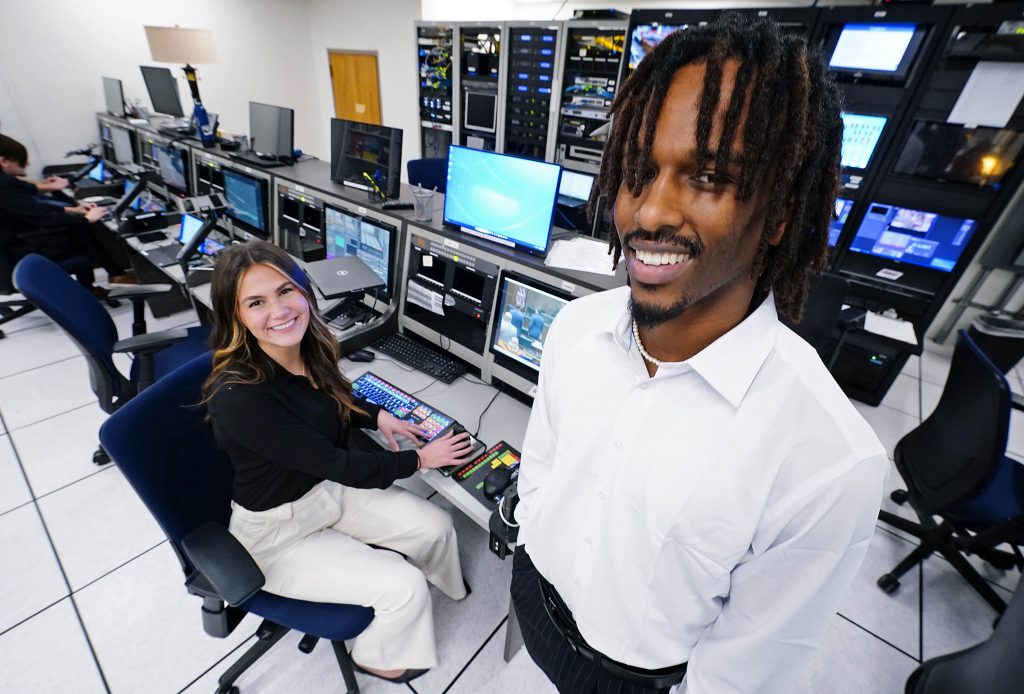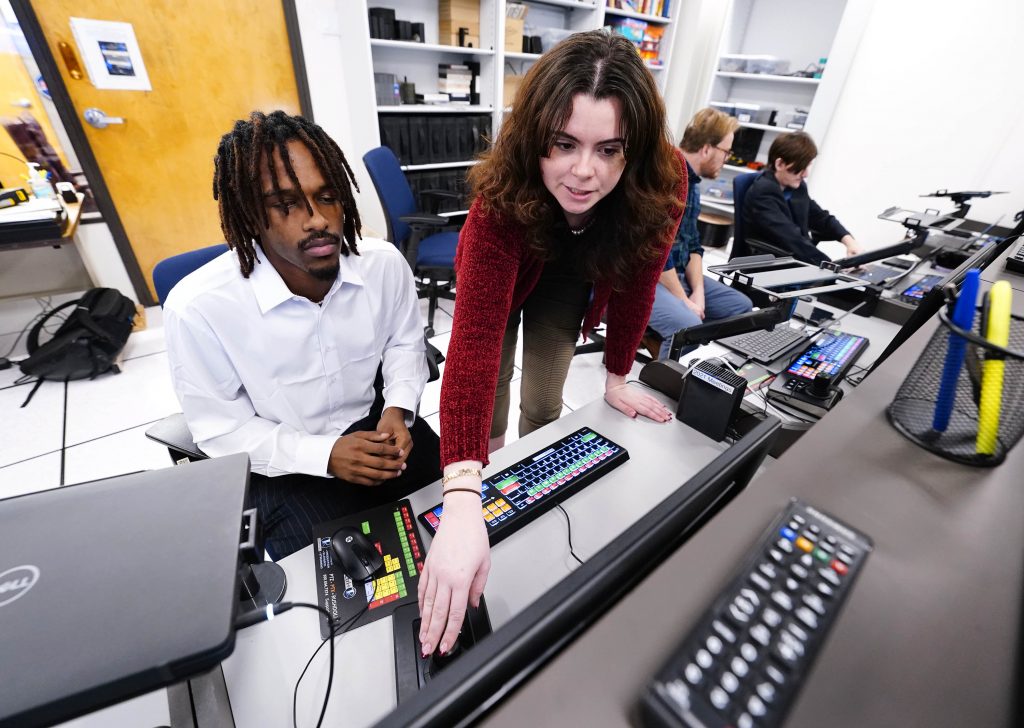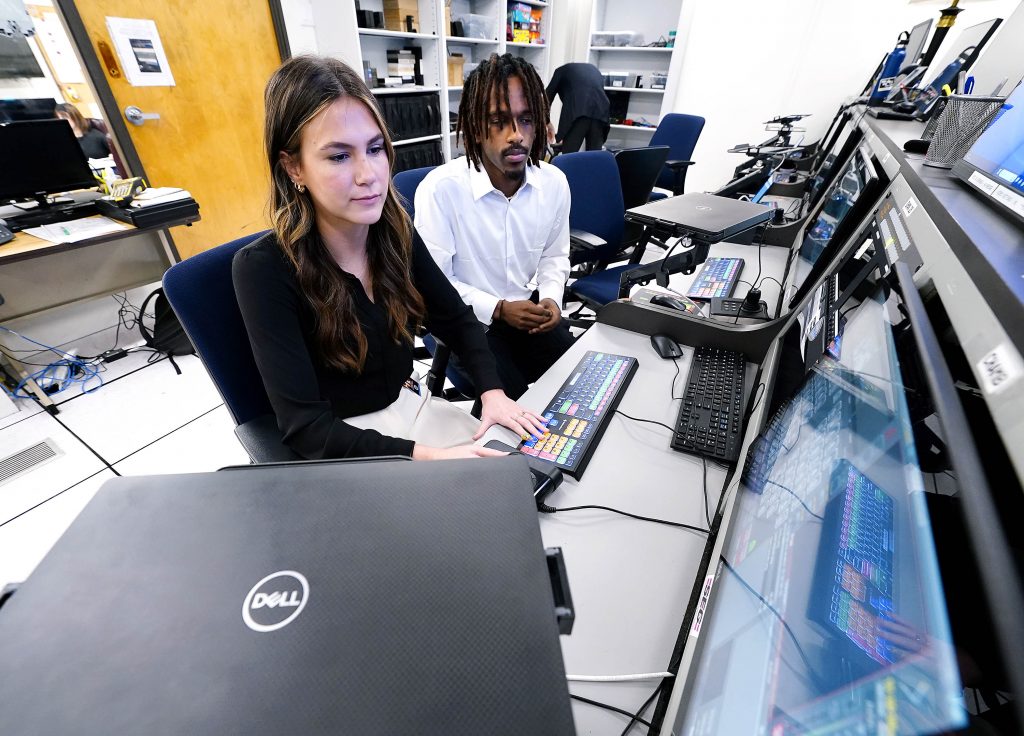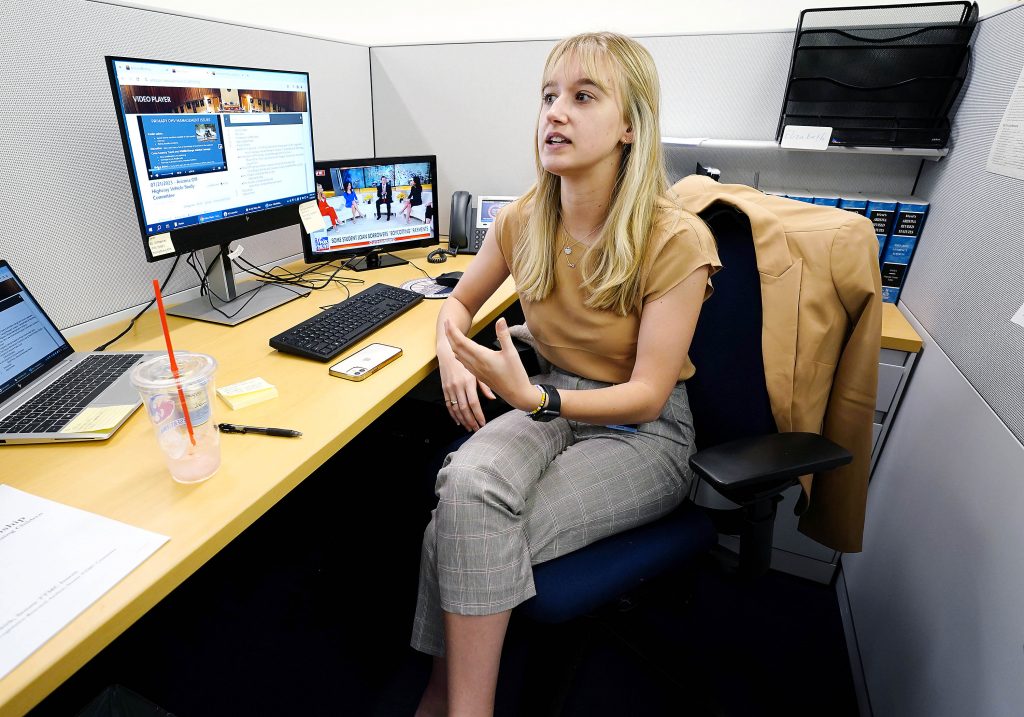
Photos by Ralph Freso
Rudwan Tahir was surrounded by dozens of screens in the basement floor of the Arizona Senate building, which looked like mission control.
“This is where the magic happens,” he said.
Maneuver a joystick one way, and a camera placed in a subcommittee hearing in another part of the Capitol complex adjusts to an overall shot of the group on his screen. Zoom in on the podium, and a legislator is orating up close.
Tahir joined Olivia Sousley as Grand Canyon University government majors who earned internships this semester with Arizona Capitol Television, which records public hearings at the Capitol for public consumption. Two other GCU students are interns with Senate research and House Republicans, getting deeply immersed in policy making and committee work.
“Everything you learned in the classroom is being applied in real time,” Tahir said. “We get to see the real intimate part of the process, the subcommittees talking on bills, the testimonies where you have real-life regular people come in and need this to happen or not because it will impact their life.”
He is learning more about the process of policy making, and broadcasting is a side benefit. Producers in the Arizona State Legislative Broadcast Center said this year they have shifted from predominately hiring broadcasting student interns to government majors, recognizing how important it is to be deeply immersed in the policy-making process.

“In the beginning, it was intimidating, but we don’t expect them to be technical experts,” said Taylor Rose Rogers, a center technician who trains the interns. “We think the internships are such a valuable resource for them to learn about the state and to see it happen.”
In less than a month on the job, Tahir and Sousley have had their eyes opened.
Tahir filmed a hearing where an economic analyst was sharing that a Republican budget that didn’t pass would have led to a surplus but now the legislature was looking to make cuts to trim a deficit.
“You will see them bickering. Sometimes they are fun hearings,” he said. “You have people going at it, and you are the one putting the camera on them.”
Sousley said it’s intense work. “You can’t divert your attention,” she says, sometimes for several hours. And often those hearings when a committee reviews the budget of an agency can be mind-numbing, Other times, it’s illuminating.
“I’ve learned a lot more about the process,” she said. “I’ve learned about public testimony and the way bills are passed. I also didn’t realize how many organizations have to be reassessed every couple years, getting evaluated to find out what they can do better.”
She said her GCU class in public policy with assistant professor Evelyn Racette prepared her for the internship – and applying for it.
“It’s a really competitive program; it is a pretty big honor to get the internship,” Racette said of the legislative internships, which were granted to four GCU students this semester. “They are not just getting coffee. They are actually doing the research and shaping the policy.”

Eligible juniors and seniors with a minimum 3.0 grade point average face a series of interviews and complete a written application, personal statement and test on policy.
“These students not only have to be poised to answer questions on their feet, but they have to know in depth about policy,” she said.
They not only get a $6,000 stiped, tuition scholarship and credit hours, the internship helps students make connections in pursuit of jobs as policy analysts, lobbyists and political party staffers, or rounds out their experience to pursue a law degree.
Abigail McLain, a 2023 GCU graduate, said the internship helped her land a job at a Christian law firm in Phoenix, supporting the government relations team.
“That was substantive work. I served on the health and human services committee and education committee helping the chairs,” she said. “Really you function as a service to elected officials and make sure they are informed.
“It really was great for me in making connections and really solidified that I did want to work in the public policy space.”
Just down the hallway from the broadcast center is the cubicle of another GCU intern, Elizabeth Buskirk. She is busy writing fact sheets and bill summaries and already has presented to committees.
“It’s a lot of pressure,” she said. “So far the work I do I honestly am learning a lot and improving on my knowledge and skills as a writer.”
Her internship with Senate research is intensive, so the senior who works with transportation and missing children committees had to hustle off to another meeting.

Across the complex, Abigail Nevers works with the House Republican staff. The senior said she was thrilled to watch the State of the State address earlier in January from the gallery.
The importance of the work isn’t lost on the interns, all buttoned down and dressed up for regular eight-hour days.
Tahir said he called on the knowledge from her class on the Constitution and its discussion of federalism when one hearing addressed a dispute on the spending of federal dollars for housing.
The two were spending part of this day taking quizzes on the faces of legislators so they can quickly identify who is talking while filming.
“Sometimes there are members very aware of the camera, and they are looking for footage,” the broadcast center’s Rogers said. “You can sit there for five hours, and they want that 40 seconds to put it on Twitter, especially if it’s a gotcha.”
Sousley is already learning a trick of the trade: “If you don’t know who is talking, you watch where everyone’s heads are going and follow them.”
Which may perfectly describe politics.
Grand Canyon University senior writer Mike Kilen can be reached at [email protected]
***
Related content:
GCU News: Student government candidates' pitch to lead is personal









































































